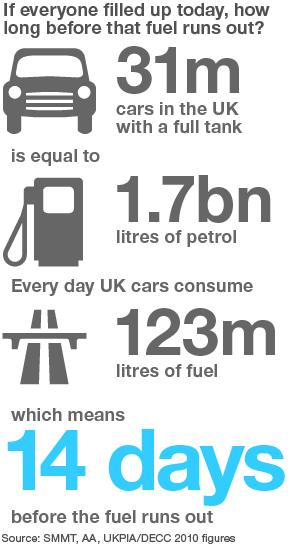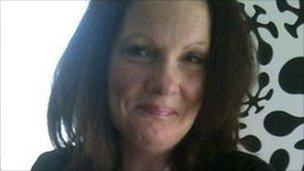Fuel strike: Advice to drivers changed after panic buying
- Published
- comments
The government has changed its advice to motorists to top up petrol tanks after two days of panic buying.
It says this is no longer urgent after the Unite union ruled out a strike by its tanker drivers over Easter.
Meanwhile, several Labour MPs have called for Cabinet Office Minister Francis Maude to resign for earlier advising storing petrol in jerrycans.
A York woman, who suffered severe burns while decanting petrol at home, remains critically ill in hospital.
On Wednesday, Prime Minister David Cameron told motorists to "top up" their tanks in case of a strike, leading to long queues at petrol stations across the country.
Up to a third of garages were reportedly forced to turn people away after stocks ran out.
The GMB union said some ambulance drivers were having problems getting fuel - the government though insisted services were continuing as normal.
But a spokesman from the London Ambulance Service said: "We are not experiencing any particular difficulties in refuelling vehicles at the moment."
He added the service was holding reserve fuel in case of any future industrial action.

Demand for petrol now seems to be waning - down from a 172% rise on Thursday to a 28% rise on Friday, according to independent retailers' group RMI Petrol.
The AA described "a rapidly improving picture at fuel stations".
A spokesman said: "The advice for drivers is to resume your normal buying patterns and to adhere to regulations on how much fuel you can carry and store."
However, the BBC has had reports on Saturday of queues and shortages continuing at petrol stations in Leeds, Tonbridge in Kent, Egham in Surrey, Bromley in south-east London, Finchampstead in Berkshire and St Albans in Hertfordshire.
There are also reports of stations increasing fuel prices, and limiting sales. In Guildford, Surrey, one petrol station is refusing to sell motorists any more than £25 worth of fuel.
Motoring experts now warn of a two to three day backlog as haulers attempt to refuel petrol stations.
A BP spokesperson also said there had been a reduction in demand on the forecourts but it still had a few sites which had completely run out of stock and were awaiting deliveries.
In the meantime, Unite would need to give seven days' notice if they plan to strike after Easter.
A political row has broken out in response to Mr Maude's comments earlier in the week.
Senior Conservative MP Bernard Jenkin said he thought the government may have been trying to divert peoples' attention away from a difficult week for the Tory party and the coalition.
"Really there should not have been any move to encourage people to buy more than they normally buy without consulting the industry first, and I think that was the mistake," he said.
'Hysteria'
John Mann, Labour MP for Bassetlaw, Karl Turner, MP for Hull East, and Labour Lord Toby Harris are among those who have called for Mr Maude to resign if it turns out his comments contributed to the burns accident suffered by 46-year-old Diane Hill.
She was seriously injured after petrol ignited as she poured it from a green jerrycan into another in her kitchen. The cooker was on and the petrol fumes ignited. She was treated for 40% burns at Pinderfields Hospital in Wakefield.

Diane Hill remains in hospital after suffering severe burns while decanting petrol at home
Mr Mann added: "[Francis Maude] was whipping up hysteria, which caused the queues as well. But he went further, and gave out advice that was wrong."
Conservative Party chairman Baroness Warsi responded angrily to the calls for Mr Maude to stand down and accused Labour of attempting to score "political points" out of a "personal tragedy".
Shadow chancellor Ed Balls said the government had mishandled the row between the tanker drivers and their employers and there should have been more attempt for talks between the parties involved.
"Starting to say instead fill up your tank, causing panic, getting out the jerry cans, has led to the queues, to the shortages, to the running out of petrol."
Adair Lewis from the Fire Protection Association told the BBC Ms Hill's accident was a "wake-up call to us all", adding: "Petrol should only ever be bought in proper containers made for that purpose. There is no place for petrol inside your home."
<link> <caption>The Department for Energy and Climate Change said</caption> <url href="http://www.decc.gov.uk/en/content/cms/news/uniteballot/uniteballot.aspx" platform="highweb"/> </link> : "There is no urgency to top up your tank, a strike will not happen over Easter."
Drivers' hours
Unite assistant general secretary Diana Holland said although no industrial action was planned over Easter as it focused on next week's talks with distribution companies through the reconciliation service Acas, this did not mean the union had backed down.
"We do still retain the right to call strike action for after Easter, should those talks break down," she said.
The rules on fuel tanker drivers' hours have been temporarily relaxed to help the transport of supplies to filling stations.
Under EU rules, drivers are limited to nine hours on the road each day, but this has now been raised to 11 hours.
The new rules will apply until Thursday and have been introduced after requests from the fuel supply industry.
Unite's drivers, who deliver fuel to Shell and Esso garages and supermarkets such as Tesco and Sainsbury's, have called for minimum working conditions covering pay, hours, holiday and redundancy.
Some 90% of UK forecourts are supplied by Unite's approximately 2,000 members involved in the dispute.
- Published30 March 2012
- Published30 March 2012
- Published13 April 2012
- Published29 March 2012
- Published26 March 2012
- Published25 March 2012